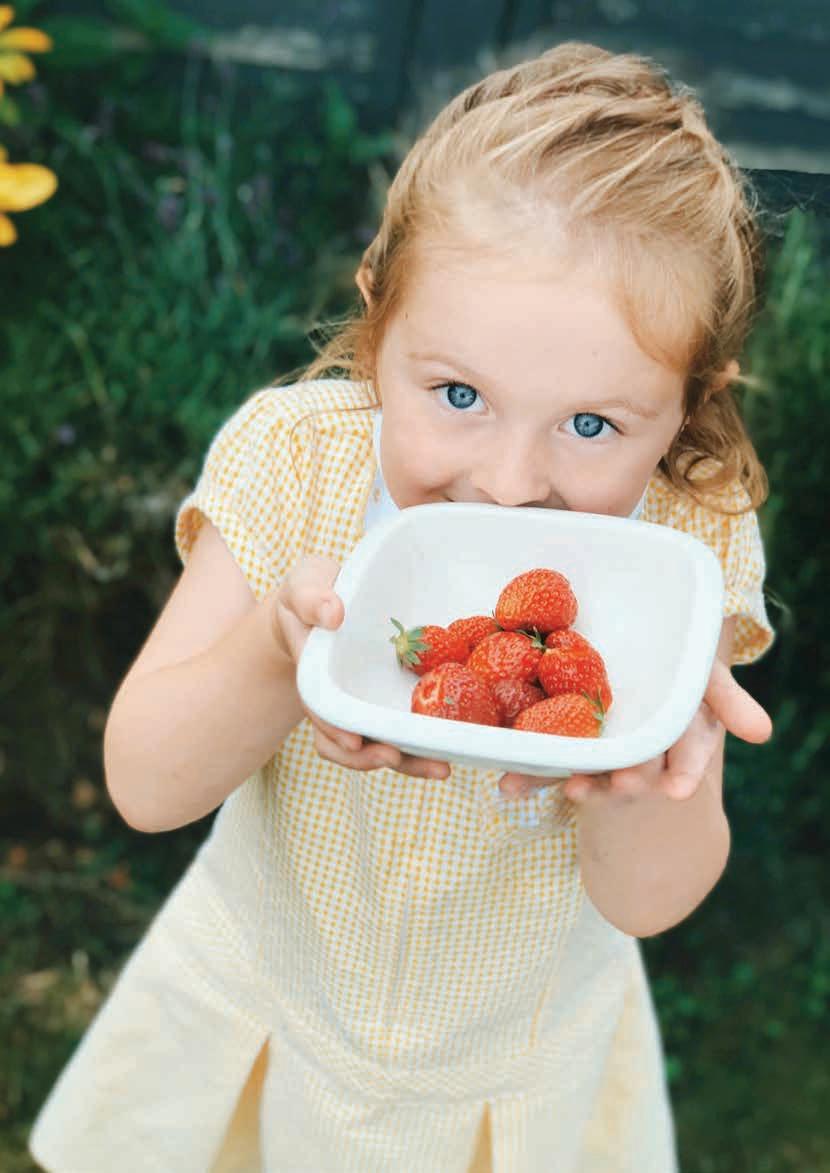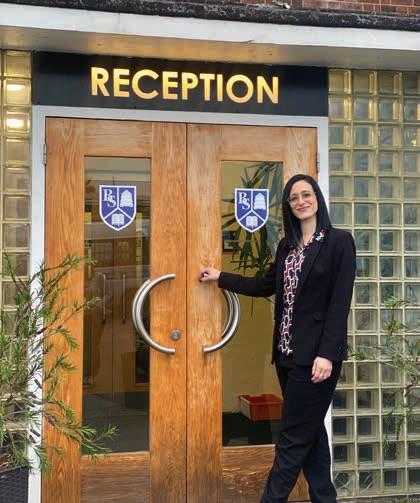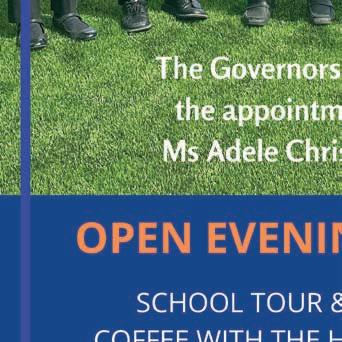
18 minute read
Education
Back To School
By Anna Coulson – Champion Tutor
Advertisement
Going back to school can bring up lots of feelings for children. They might be happy to go back, wish they were still at home or want to be somewhere else completely. Children might be worried about:
• What the school will be like when they go back. • Catching up with work and how they’re going to be assessed. • Seeing friends again. • Being bullied. • Starting a new routine, or coping away from home. • Keeping safe and following social distancing.
You might also be worried about problems at home getting worse by them returning to school. Whatever’s worrying you about school, don’t suffer alone.
Here are some common concerns of parents and some suggestions that might help.
I’m worried about my child’s mental health
Due to the COVID pandemic, this is the biggest concern any of us face. It has been drawn to our attention so many times and you are not alone.
It has been such a stressful time for many children and a few have had a hard time coping. While we don’t have all the answers we do have a few remedies which could help. The best way that we can support children and young people with anxiety is to find ways to face the feared situations. Help plan ways for them to test out their fear gradually and set specific goals: for example speaking in class, putting their hand up to answer a question.
We also need to stay calm yet supportive and try not to get drawn into emotions. It helps if you are supportive yet stay practical.
Instead of reassuring the child or young person that nothing bad will happen, ask things like, ‘what has happened in this situation before?’
Help the child or young person think through what they learnt about their fears and about themselves (e.g. did their worry come true? Did they cope?) You can help them to rate their anxiety levels on a scale of 1-10, and notice when they face their fear situation repeatedly the anxiety level goes down.
We are all different. Remember that anxiety can come and go, and that what helps one person may not help another. If you have any questions about this, please contact Anna at Champion Tutor who will be happy to talk through any specific needs. Champion pride themselves on being the only tuition company that combines the highest level of academia alongside embedding strategies for good mental health.
I don’t know how my child will react to the changes in school
The best thing we can do as parents is be aware that all our children, whether they show it or not, will be feeling anxious (and excited) to be returning to school. We need to talk to our children during the first few weeks of school to ensure they are aware of new routines, friends and teachers.
Open communication and listening to their concerns will enable them to trust you and the process of returning.
Becoming over-scheduled
Children have lost the routine of school; for years the length of the summer holiday has been in dispute as it takes almost the full first term to recap and get back into the swing of things.
September comes round quickly and tires the children within the first few weeks. It is always a good idea to keep extracurricular activities to a minimum for the first few weeks. Introducing little and often is a great way to start.
You don’t have to have all the answers all of the time
When the usual ‘back to school chaos’ emerges, you don’t always have to be the one to rectify it. Allow siblings to take their frustrations and anxieties and work it out together; as long as it doesn’t come to fisty fights it can be a great way of peers sorting things out.
When your child is slamming doors, and grunting around the house in the morning before school, don’t fix it. They are venting frustrations and learning. The old quip ‘I told you so’ or ‘this should have been done last night’ doesn’t help. They will figure it out themselves...eventually.
We did no work over summer
It’s ok. Children need freedom and time to make precious memories with their friends and family. Confidence in school work can be increased with the help of a tutor. This can be a family member, older sibling or, indeed, the support of a professional tutor.
I’m worried my child has fallen behind and won’t catch up
I wholeheartedly recommend an assessment. This will identify gaps and ensure that the right areas are targeted for the year ahead. Champion offers this service and not only can this be done at home but you can have a top educationalist talk through next steps.
Get Set For September:
Your Parenting Back To School Guide
Whether your child is taking those emotional fi rst steps to nursery, making the move from nursery to ‘big school’, or starting out at secondary school, how can you best prepare them for the ‘back to school’ milestone? Successful North London school group, North Bridge House, share their top tips.
Open up the conversation
“Starting a new school or moving up a year can feel like a big leap for children and there is no better way to normalise their feelings and settle any apprehension than by talking,” says Tom Le Tissier, North Bridge House Prep School Head. By opening up dialogue about our children’s transition, we nudge them towards retrospection, which encourages both resilience and enthusiasm for the next step. Schools that are part of educational wellbeing communities and platforms like North Bridge House will have access to a wealth of parent resources, to prompt and support these conversations; make the most of the tools on off er to promote your child’s mental health and don’t be afraid to seek further advice from the school.
Journalling is your best friend
“Transition booklets are something we fi nd very useful here at North Bridge House – creating one is a cathartic opportunity for children to visually represent and process their transition, including photos and descriptions of previous and new settings, teachers and friends,” says Michelle Blaber, Headteacher of North Bride House PrePrep, Hampstead. Making an ‘All About Me’ booklet or summer journal is also a creatively benefi cial exercise; it’s something children can share with their new teachers and classmates in September and will keep them occupied during the initial stages of apprehension.
Hammer home the importance of homework
...Metaphorically speaking! “The summer holidays will have been important downtime for your child, and they should not feel bogged down by the curriculum they are about to start, nor do they need to know their times tables off by heart before any member of their new class,” Brendan Pavey, Executive Headteacher of North Bridge House reminds us. However, come September and their fi rst piece of homework, they will be all the more motivated to complete it if you have crafted a special homework station with them in advance. Whether it’s in the corner of the home offi ce or in the conservatory, get the tools out of the garage and, together with your child, build a super cool, grown-up homework space, equipped with a desk and shelves, a picture of their pet and a stash of epic new stationery. Some fairy lights and a colourful chair could make it all the more a place they want to be rather than have to be. And having a dedicated space for your child to work will improve their focus come that fi rst assignment.
After school clubs are saviours
Not only do they provide working parents with childcare solutions and single parents with the opportunity to run a comb through their hair, but after school clubs are a great way to develop social skills, extra-curricular interests and friendships as your child settles into a new school or year group. From yoga, tap dance, Spanish and ukele - to name but a few - at the Nursery and Pre-Prep Schools, to almost 40 diff erent clubs at the Prep School, North Bridge House presents every opportunity for children to develop a range of skills beyond the curriculum, but most importantly, to grow in character and confi dence. “And opportunities for your child to socialise are so important in helping them to develop empathy and kindness towards others, as well as improving their confi dence and communication skills,” says North Bridge House Nursery & Pre-Prep Head, Eilish Sleator. There may even be valuable initiatives in place to settle your child into their new school ahead of September: The New to North Bridge programme – a series of settling in events which take place in the academic year prior to entry – also initiates friendships between children and parents, presenting the opportunity to connect and have play dates in advance of the fi rst day of school.
Don’t buy secondary school uniform too big
“Adolescence is a challenging time for children and with it can come concerns over image and experimenting with identity,” says North Bridge House Senior Canonbury Headteacher, Charlotte Tassell-Dent. Kids do not want a blazer two sizes too big because you said they would grow into it. (An oversized school hoodie, however, is much more on trend!). While respecting the uniform rules and encouraging your child to take pride in their appearance and representation of the school, allow them to be as confi dent in their uniform as possible. Starting a new school comes with the anxieties of making new friends and wanting to fi t in, and kids are generally a lot more invested in how they look. Liberal schools like North Bridge House will also have a gender-neutral uniform, so take the time to go through the options with your child and ensure they have picked out the items they will feel most comfortable in.

Eager Early Years
By Aimee Hart @hart_at_home
“How was your day darling?” you may ask your child each day as they come home from school. Answers will vary from “Can’t remember” to “Dunno” and my all-time favourite…“Nothing.” These will become commonplace amongst the conversations you will have with your offspring. As a teacher, I can guarantee that they did not spend 6 hours staring into space doing nothing. In fact, their day will have been so jam-packed with play, education, socialising and general learning how to be independent that their little brains may be quite frazzled 30 seconds after leaving the building. If you are a new-to-school parent this may cause some worry. It may seem like they are not happy. It may seem like they are not learning. It may seem like they have no friends. Settling in to a new environment is a big change for children and it will take them time to find their feet, but the stimulating environment that schools provide will allow them to come into their own…in their own time.
Friendships
From my experience, children in the early years of school don’t have ‘friends’ in the same way as older children. Young children will happily play alongside a range of children before moving toward playing with specific children who share the same interests. This allows children to figure out their personal choices and how similarities amongst people lead to friendships. At this age it is very unusual for children to be mean, or bully others intentionally. This is usually learnt behaviour or experimenting with boundaries.
Behaviour
Lots of parents worry about the behaviour their children exhibit in the early years of school. Often it is hard to control, hard to communicate and unexplainable. When settling in to a new school environment your child’s behaviours may change. This could be down to growing and changing or it could be copying behaviours they’ve seen at school. Consistency with communication, boundaries and explanations will always help children begin to understand what their behaviour may lead to. The main thing to remember is that all behaviour has a meaning. There is no such thing as bad behaviour.
Learning – Prime Areas
The Early Years Curriculum is designed to support the whole child and not just their academics, so don’t worry if they come home and say they’ve played all day. The three prime areas are: Communication and Language, Physical Development and Personal and Social Development. These focus on how your child can communicate, move and socialise. These elements are fundamental to them progressing and will be a main focus of their early journey in school. Child-initiated play and adult-directed play are both used within the classroom to support the development of these.
Learning – Specific Areas
Alongside the Prime Areas of the Early Years Curriculum there are also the four specific areas which link to subjects you may recognise. These are added to the classroom – commonly linking to the theme of the classroom. Literacy, Mathematics, Understanding the World, Expressive Arts and Design. These are all on a basic level and in schools are often something the staff will set up and allow the children to manipulate themselves. These are the beginning building blocks of learning that will stretch into their future Primary Years Curriculum.
How to support
• A positive drop-off – The best thing to do to help your child start their school journey is to be positive about it. You may feel worried, teary or sad at this new chapter but they will respond to your reaction. Be excited as you drop them off. Wish them a good day and walk away with a smile. It can be hard if your child starts to cry as you leave and you MAY be tempted to go back and console them… but if you allow the staff to do that and give them time they will eventually settle. If they see you return when they cry, they will link this reaction with school dropoffs for a while.
• Homework – And I don’t mean getting workbooks and sitting them down to do fractions! Continue their experiences and communication. Talk to them about their world and explore their environment.
Read stories at bedtime and sing familiar songs. Count their strawberries as you cut them and plant seeds in the spring.
Homework shouldn’t be a chore – it should continue the learning.
• Independence – This takes time to build, but if you have expectations that they complete certain things themselves, they will develop an internal discipline and have expectations of themselves. Begin with something simple like putting their bowl in the sink, putting their toys away or getting dressed. These little tasks will soon become routine.
These Early Years of Primary School are some of the most rewarding years for children. This is where they come to realise the type of learner they are, the kind of friends they need and the kind of person they will become. They are able to make choices about their learning and will surprise you with how much they grow. Enjoy these years together.
More of the Early Years Curriculum can be found on the Gov.uk website – Development Matters Document.
Website: myevelynandme.com


AS GLOBAL PERSPECTIVES
AS LEVEL THINKING SKILLS
AS LEVEL CITIZENSHIP
AS LEVEL LAW
GCSE LATIN
THE ACCREDITATION FOR LANGUAGES IN BUSINESS [FRENCH]
Aiming High
Exam results days are a rite of passage. All children, and their parents, have to go through them. The exams themselves are bad enough, but then there is the waiting – and inevitably the more time that elapses the easier it is to focus on the things which might have gone wrong in the exam hall. I remember it from my own school days, and as a teacher I re-live it every year. As a parent, this year I experienced the double whammy of GCSEs and A Levels in the same year! Some students perform exceptionally well in exams, others – despite just as much eff ort – do not. At Mount House we celebrate all our students’ achievements, no matter how ‘good’ the outside world might judge them to be. We are a small school and we know our students well. We know that our results will go up and down in each year, depending on the ability of our mixed and inclusive cohort. Our expectations are clear and they are high: we expect that every student will do their best, will focus in lessons, will complete homework and we encourage them to ask for help when they need it. If they do that, they will achieve results of which we are all proud. Of course teenagers don’t always work as hard as they can, and of course things can go wrong in the exam hall – but learning to fail is also a rite of passage. As a parent, I do know it is terribly hard to ‘allow’ your child to fail. As a teacher, I know how important it is that children get things wrong, because without this they cannot learn to deal with adversity. As adults we all need to know how to manage set-backs, how to pick ourselves up, how to focus on what we might do diff erently next time.
We all know there is more to life than exams. Exams are a blunt instrument of judgement and no young person should be made to feel inadequate on the basis of their exam results. I congratulate those whose children have achieved great results, and I commiserate with those whose children have not. I urge you to remind your children that exams can always be re-taken, or an alternative route can be followed. I urge you to celebrate your child’s other achievements, in art, sport, music, drama and good citizenship.
“We are delighted with the achievements of our students and proud not just of their results but also the young adults they have become.”
Mrs Sarah Richardson Head Mount House School
If you have not yet visited Mount House, we would be delighted to welcome you to our next Open Morning on Saturday 24th September.
For more information Find out more about about Sixth Form and Mount House School at Open Days, please call www.mounthouse.org.uk 020 8449 6889 or by calling 020 8449 6889 or visit the website or emailing admissions@ mounthouse.org.uk www.mounthouse.org.uk

Broomfi eld School appoints a new Headteacher for September 2022

The Board of Governors of Broomfi eld School is delighted to announce the appointment of Adele Christofi as our new Headteacher. Adele will lead the school from September 2022, taking over from Cate Seymour who has been Interim Headteacher for the past year.
Adele joined Broomfi eld following 12 years at Holy Family Catholic School in Walthamstow, in the role of Head of the Upper School. Prior to that, she was at Queen Elizabeth’s Girls’ School in Barnet, where she was a Head of Year and Acting Assistant Head Teacher.
Adele joins us with a background of drama teaching. She studied at the prestigious Royal Central School of Speech and Drama, which has trained the likes of Laurence Olivier and Dame Judi Dench. Whilst at Central she completed a degree in Drama and Education, followed by a PGCE in Drama. Most recently, she has also completed the National Professional Qualifi cation for Headship alongside the Institute of Education.
The Chair of the Board of Governors, Prof. Gregory Thwaites, began the recruitment process in December 2021, intent on fi nding a candidate with the requisite qualities to maintain, and build upon the educational standards already in place at the school.
“Adele impressed us all throughout the process with her vision, warmth, experience, attention to detail and passion for comprehensive education” said Mr Thwaites. “This is a new step on Broomfi eld’s journey of continual improvement.”
“I’m really excited for Ms Christofi to be our headteacher from September. Broomfi eld is a great school with lots of opportunities for me to excel both in the classroom and in our school community.” Year 10 student.
“I joined Broomfi eld in September 2021 and I have already been involved in lots of sports clubs, music clubs, law society, debating society and the school production of Matilda. I am also a Broomfi eld Ambassador which means I get to go back to my primary school and talk about the move from primary to secondary school.” Year 7 student.
From Ms Christofi :
At Broomfi eld School, are committed to all students having a quality education that is underpinned by an ambitious academic curriculum and is supported by a range of personal enrichment and super curricular opportunities, with our overall aim to develop well rounded young adults, ready to tackle the world.
This is achieved through our 4 key areas: • Curriculum • Character • Culture • Community
By following these 4 key areas, Broomfi eld students will understand their learning in relation to the wider world we live in. Students will be developed into leaders who are fully prepared for 21st century life.
Come and see Broomfi eld in October at our Open Evening on Tuesday 4th October at 6pm. Listen to my vision for the school, meet our students and see our facilities. I look forward to meeting you all individually.
















